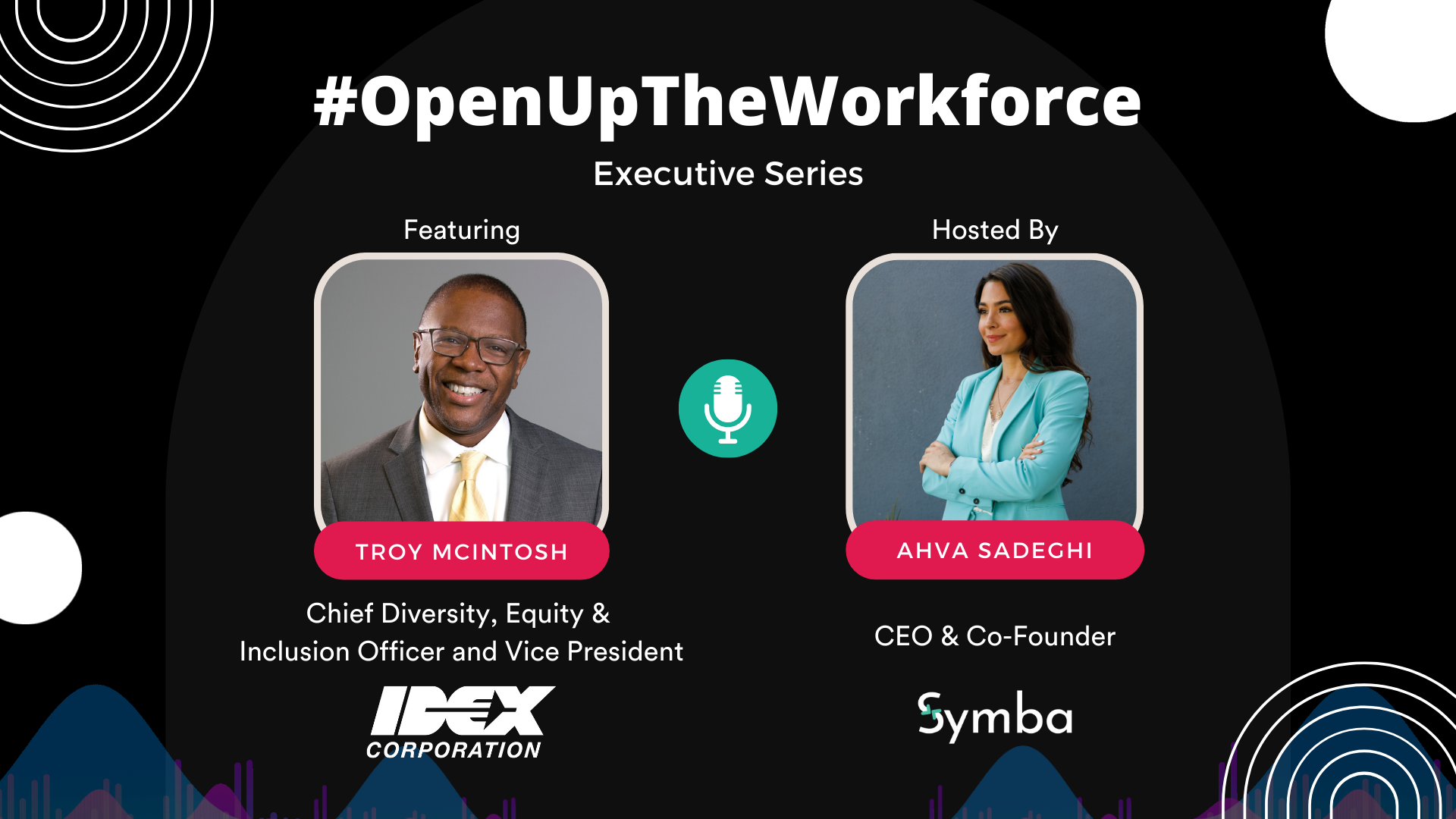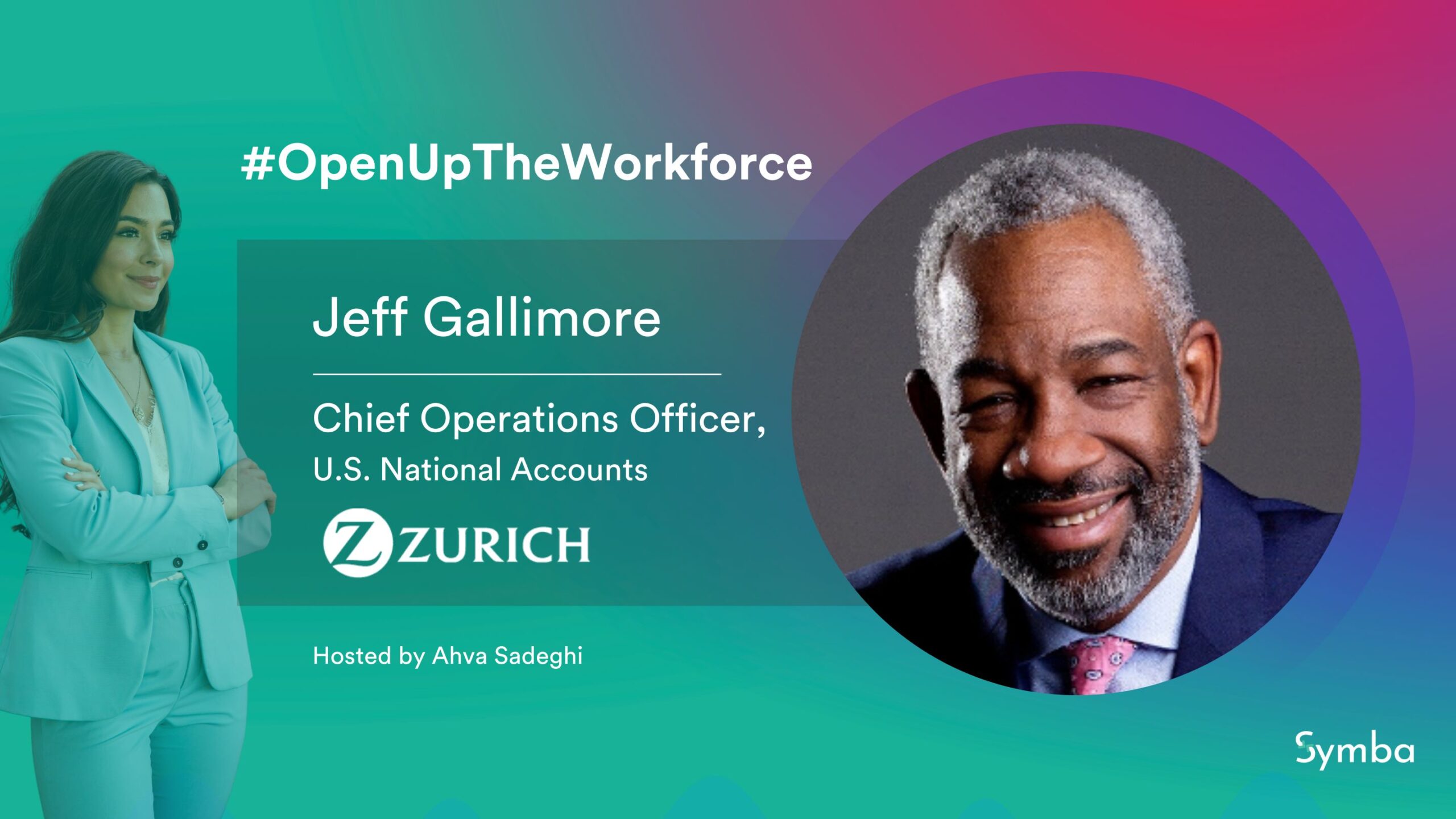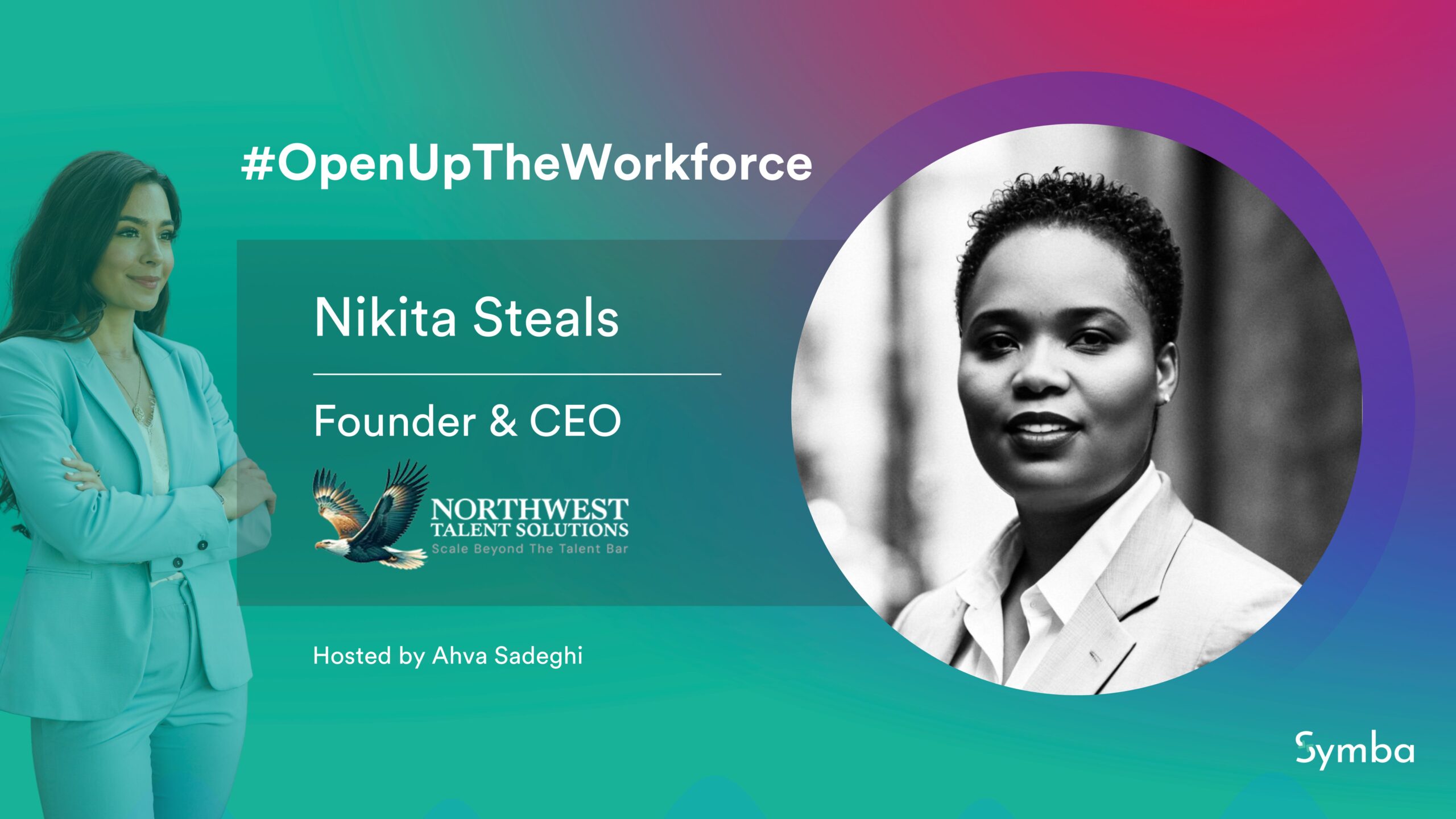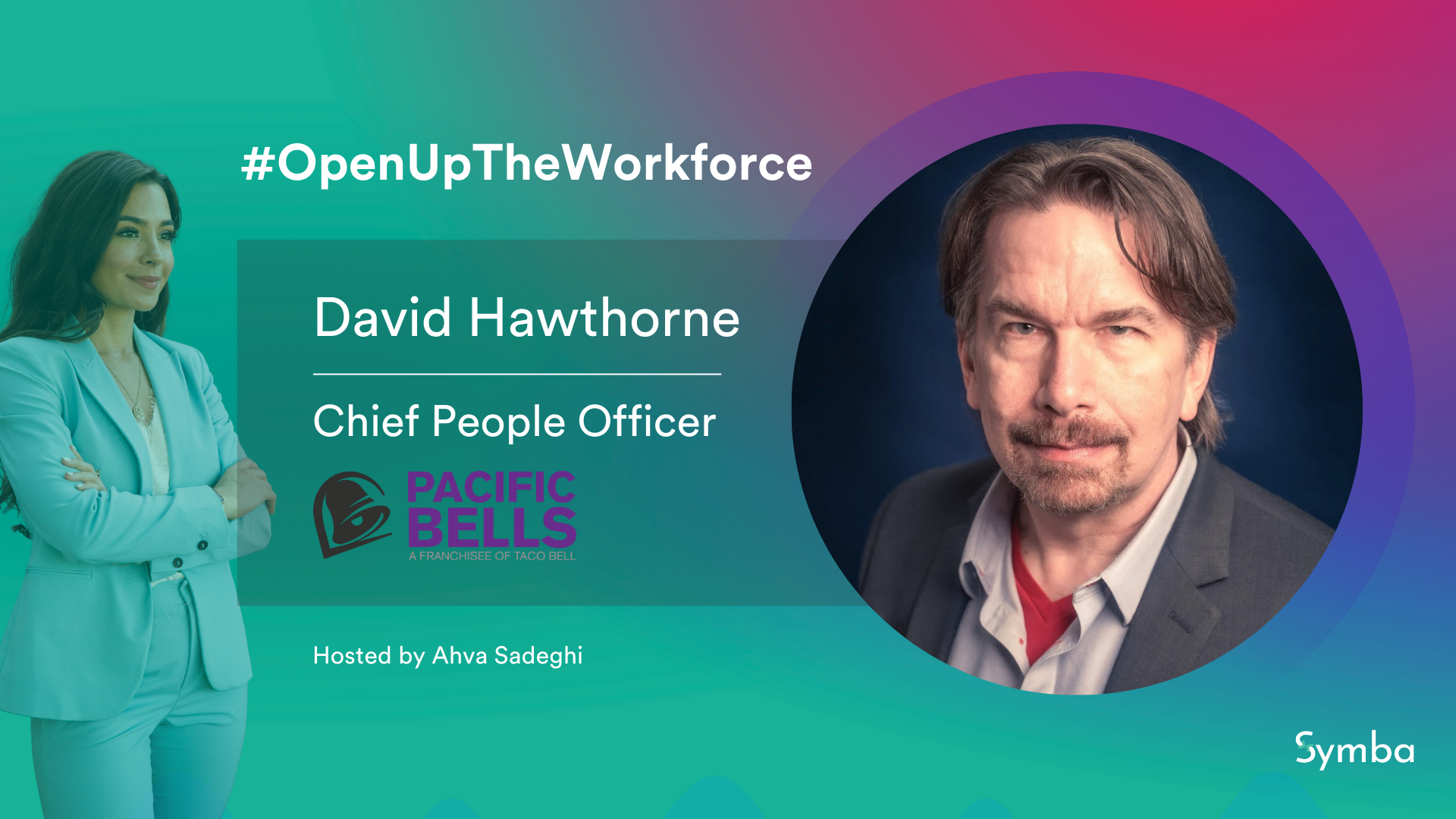Presented by Symba, #OpenUpTheWorkforce interviews feature executives advancing inclusion, diversity, and equity for the future of work. In these short audio-only episodes, host Ahva Sadeghi speaks with top leaders about what it takes to develop and implement inclusive processes.
In this episode of #OpenUpTheWorkforce, Ahva speaks to Troy McIntosh, the vice president and chief diversity equity and inclusion officer at IDEX Corporation. As a member of the Executive Leadership Council, Troy is also a trailblazer in promoting social equity, diversity and inclusion. Troy shares his career journey, including how he got into diversity spaces and how he is promoting it at IDEX. As a DEI thought leader, he shares a trove of insights and strategies for building diverse and inclusive workplaces. He also has a word of advice for young professionals looking to get their foot in the door. You can listen to the whole episode here.
Tracing Troy’s Career Journey
Troy has worked in diversity for a little over 10 years, after stints in leadership development at different companies including United Airlines and Abbot Laboratories. As a leaders’ accelerator, Troy discovered he had a passion for everything equity; from training people on equity to ensuring programs are built around equity. When he received calls to lead diversity programs, Troy didn’t have much to ponder about; he grabbed the opportunity with both hands. After all, these were the themes that had defined his career. Troy’s role at IDEX Corporation is a culmination of what he has prepared all his life; accelerating equity and amplifying the voices of underrepresented people.
Here are the key takeaways from Ahva’s interview with Troy:
How Leadership Development Mirrors Early Career Programs
Troy shared his experience in leadership development and how this concept mirrors early careers. He starts by saying that early career folks face similar challenges later in their career such as a lack of mentorship, sponsorship, and bias. There is also a clear lack of support on how to navigate the corporate environment. Troy also decries the inability of company senior leaders to listen and act on feedback from historically marginalized groups, which is a significant hindrance to leadership and career progression for these populations.
How IDEX Corporation Developed its DEI Playbook
As the diversity leader at IDEX, Troy shares how the company developed its diversity strategy. He explains the four key elements of the strategy:
- Correct mindset: People who work in diversity need to have the right mindset to foster the right level of engagement. Employees and diversity teams at IDEX undergo assessments and coaching to enhance their cultural competence and self-awareness.
- Amplifying underrepresented voices: Organizations need to listen to the voices of those who have traditionally been underrepresented. IDEX makes it its mission to listen to diverse groups such as society of women engineers, National Black MBA and research organizations.
- Inclusive leadership development: Troy cites the importance of building inclusive leadership competencies through training programs. At IDEX, for instance, the company has a training leader whose sole deliverable is ensuring people gain the necessary competencies to thrive in inclusive workplaces.
- Equity results: What gets measured gets done. This adage applies aptly to advancing diversity and inclusion in the workplace. Whether it's measuring diverse talent acquisition, promotion rates or pay equity, tracking these metrics empowers the company to know how far and fast they are progressing in the right direction.
Getting Leadership Buy-In for DEI Initiatives
“If your CEO is not supportive, it’s virtually impossible to push diversity work forward.” —Troy McIntosh.
Getting company leadership to support diversity, equity and inclusion initiatives is non-negotiable for success on this front. Troy shares his experience at IDEX:
When the company was building its DEI strategy, its CEO, the executive leadership, and the board were all aligned. The CEO kick-started the journey with a task force to lay the groundwork for the DEI strategy. With the strategy now rolled out, the senior leadership continues to be heavily involved; from monitoring progress, providing feedback, and integrating the strategy across the 45 business units at IDEX.
As an indicator of IDEX’s commitment to DEI, the company’s board has improved its diversity in terms of ratio and gender, with the board’s chief being a woman. What’s more? Board members are also diversity champions at their companies. At IDEX board meetings, it's now standard practice to discuss diversity. Troy, as the chief diversity officer, along with the CEO and the CFO are required to present and respond to the board’s concerns on diversity. This enhances accountability for equity results.
Leadership support for DEI initiatives is also a critical ingredient for the sustainability of the program. With Gen Z looking to work in organizations with a clear purpose and social values, supporting DEI can help companies attract the next generation of talent.
For Chief Diversity Officers looking to get this level of support and buy-in, Troy advises that the CEO has to be aligned with the strategy. If the CEO is aligned, it becomes easier for them to influence the board on what’s strategically important. Also, if the CEO is supportive of DEI initiatives, the leaders eventually get the message of what’s expected. Eventually, you can achieve full integration into everything the company does.
How the IDEX Board Tracks Progress on Diversity
One of the things that surprised Troy at IDEX is the level of the board’s engagement on DEI issues. So, here’s how the board keeps tabs on DEI:
Once a year, Troy and the head of HR present a joint report to the board on key diversity metrics such as the talent acquisition approach, succession pool, and high potential mix. Diversity is also one of the KPIs for the CEO, the executive team and senior leaders. So, they also present to the board how their business units are doing with regard to equity.
Besides key metrics, the board is also keen to listen to initiatives undertaken to advance DEI. These include any work done with resource groups, upcoming DEI meetings, and diversity outreach programs lined up during the course of the year.
To further demonstrate the level of board engagement, Troy shares how IDEX board members are always eager to be part of Inclusion Summits. The Inclusion Summit is a two-day virtual event that focuses on inclusion development at the company. Despite being a virtual event, board member's involvement in the event is always felt.
Troy Speaks about the Collegiate Talent Program
Ahva invited Troy to speak about the Collegiate Talent Program, an accelerating management potential program that was launched in 2020. Troy attributes the program's success to on-site recruiting through partner organizations. Once emerging leaders are identified, they receive coaching and support as they rotate through different departments of the company, such as operations, finance, and HR. A strong partnership with the talent team and collaboration with local chapters of partner organizations have been critical pillars of this program.
Measuring the Success of Diversity Programs
Measuring the success of diversity programs cannot be overemphasized. DEI leaders need to find out what’s working, and what needs tinkering. Troy speaks about key equity metrics at IDEX, including:
- Cohort diversity
- Promotion rates
- Retention rate per cohort
- Quality of the hires
- Performance of the hires
For Troy and IDEX, it’s not just about diverse hiring, but most importantly about the progression of these hires in the organization.
Tracking these metrics can be a headache. To get around this problem, the HR team, with insights from Troy’s team, developed an HR Metrics Dashboard. Through this dashboard, IDEX can track how different business and functional units are achieving diversity.
Troy’s Advice to Aspiring Talent
Career growth isn’t just about vertical movement up the organization. Troy avers that gathering experience, even through lateral moves, is equally valuable. While factors like increased pay and higher management roles are important, many executives have benefited from lateral transitions. Such career moves offer diverse experiences through special assignments and projects. Despite being challenging to quantify, these experiences contribute positively to career trajectories. Sharing his personal experience, Troy says he was in at least eight diversity projects before he had a diversity title. Troy urges aspiring talent to accept project opportunities as they add valuable, resume-worthy experience.
What are the Next Steps Leaders Need to Take in Order to #OpenUpTheWorkforce?
Answering this question, Troy traces his inner-city and public-school roots, which didn’t give him much of an opportunity to break through the corporate world. To open up the workforce, Troy emphasizes the need for young professionals to receive mentorship and support around issues such as:
- Wealth creation
- Navigating the corporate world
- Building a resume with concrete accomplishments
- Communicating these achievements compellingly
Such support enables upcoming professionals from underrepresented communities to understand how all these elements intersect, which is crucial to getting their foot in the door.
Final Thoughts
Is DEI facing a pushback in the corporate world? Troy disagrees. Companies rolling back DEI gains were never serious to begin with. Listening and supporting everyone to thrive is central to progress at a national and global level, he concludes.
About Troy McIntosh
Troy joined IDEX in July 2021 as the Vice President and Chief Diversity, Equity and Inclusion Officer and reports directly to IDEX CEO and President Eric Ashleman.
Troy joined IDEX from Chicago-based U.S. Cellular, where he served as the Head of Diversity & Inclusion. At U.S. Cellular he increased the diversity of the workforce – particularly in leadership – and led campaigns to increase awareness of bias in the workplace and in hiring, helping build a culture of inclusive leadership. His previous Human Resources experiences have included roles at Ingredion Inc., Pactiv, Johnson Controls, Abbott Laboratories, Sara Lee Corporation and United Airlines.
Originally from Grand Rapids, Michigan, Troy earned a Bachelor of Arts degree in Psychology and Philosophy from the University of Notre Dame, followed by a Master of Arts in Social Service Administration from the University of Chicago. He began his career as a high school social worker and an education consultant in the Office of Catholic Education for the Archdiocese of Chicago. His Diversity, Equity & Inclusion work today ties back to those early education roles, through which Troy was a champion for people seeking to overcome barriers and achieve a better life.
Troy and his wife live in suburban Chicago with their two daughters. He enjoys writing music, playing piano, and singing.
.
.
.
View all episodes of #OpenUpTheWorkforce here. Are you an executive leader increasing access to jobs and wealth creation? Request to be featured and show us how you #OpenUpTheWorkforce.





